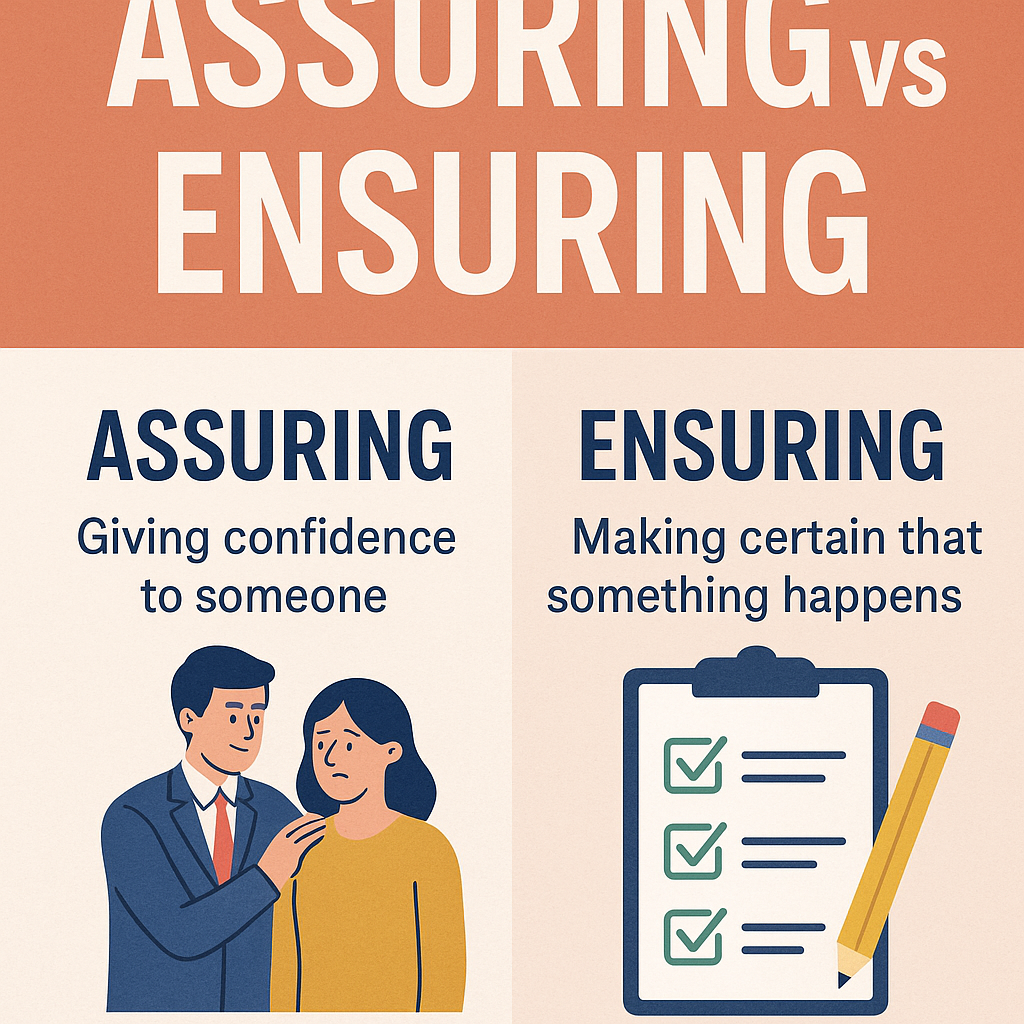Assuring vs Ensuring

Writers often confuse assuring vs ensuring because both relate to certainty and confidence. However, these words have different meanings and functions. “Assure” typically involves giving someone personal confidence, while “ensure” means making sure something happens.
Understanding when to use assuring vs ensuring will improve the clarity and professionalism of your writing. Let’s break down how they differ.
Grammatical Explanation of assuring vs ensuring
“Assure” is a transitive verb used with people. When you assure someone, you comfort or promise them something directly.
- Example: She assured him that everything was fine.
(Active voice – subject performs the action)
On the other hand, “ensure” means to make certain that something will happen. It’s also transitive but refers to events or conditions, not people.
- Example: The team ensured the project met its deadline.
(Active voice)
When comparing assuring vs ensuring, remember that “assure” comforts people, and “ensure” secures outcomes.
Real-Life Examples
Assure (people):
- I assured my friend the issue wouldn’t repeat.
- The manager assured the client of a prompt solution.
Ensure (outcomes):
- They ensured the gate was locked before leaving.
- The policy ensures your safety during emergencies.
Avoid the passive voice:
- The client was assured by the manager.
The manager assured the client. (Active)
Common Mistakes in assuring vs ensuring
One of the most common errors when using assuring vs ensuring is swapping the two words without thinking about the subject. For example:
- We assured the documents were submitted on time.
We ensured the documents were submitted on time.
In this case, the action refers to making sure something happened—not comforting a person—so “ensure” is the correct verb.
Another mistake is trying to use “assure” without a direct object (usually a person):
- The team assured the system was safe.
The team assured the customer that the system was safe.
Remember, “assure” needs a person to receive the assurance. Mixing these up can make your writing unclear or awkward.
Memory Tips
Here are a few easy tricks to remember assuring vs ensuring:
- Assure = A person
Think: “Assure Anne” – you always assure someone.
“Assure” starts with A, and so does Audience—use it when addressing people. - Ensure = An Event
Think: “Ensure Everything” – you ensure that something happens.
“Ensure” sounds like secure—use it when you want to secure an outcome.
Another way to remember:
- If you can add “someone” right after the verb, use assure.
- If you’re talking about a process, deadline, or result, use ensure.
These tips will help you choose correctly and write with confidence.
Conclusion
Use “assure” to address people directly and “ensure” to guarantee results. By choosing the right verb and keeping your sentence active, you’ll write with more clarity and precision. Mastering the difference between assuring and ensuring strengthens your control over formal English.
Want to explore more word pairs? Check out our post on Affect vs Effect for another useful breakdown.
For a deeper dive, see Merriam-Webster’s explanation of assure vs ensure.